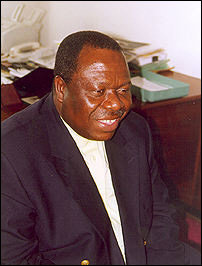 Gateway
for Investors Gateway
for Investors
Ghana’s determination to forge ahead has manifested in a long-term program called vision 2020 which was fashioned to lift the country to a medium income earner by that year. President Rawlings admits that for Ghana to achieve the targets of the vision which was begun four years ago, "it will mean hard work, integrity and dedication of all the people. But it will also need the understanding of the international communities".
Many have described Vision 2020 as yet another ambitious program because of the difficulties on the global economic scene, but the Vice-President optimistic about Ghana attaining the status by the year 2020 explained "What Ghana will do is to find solutions to its over dependence on its commodity exports, try and broaden out, diversify into non-traditional exports and invest in human resources and promotion of tourism." "That is not all, Ghana will also pursue its Gateway Project to establish the country as the destination for investment in the West African sub-region" he said.
Dr. G. Sipa-Adjah Yankey , the Chief Executive Officer of the Ghana Trade and Investment Gateway Project , explained that the Gateway Project launched this year in February is one of the vehicles being used to realize the goals in Vision 2020.

A major component of this seven year program is hinged on a Free Zones Project which is aimed at attracting export oriented companies and to serve as a catalyst to stimulate new private investment in the country. With a World Bank assistance, Ghana is spending a total of 56 million dollars, to provide basic infrastructure facilities such as roads water and electricity to the established enclaves. The Free Zones Program is made up of three sectors. The Export Processing Zones (EPZ), Free Ports and Open Skies policies which envisage the location of Free Zones within the various sectors.
The program is completely private sector driven with the government’s role limited to facilitating, regulating and monitoring activities of the zones’ developers, operators and enterprises.
The Ghana Free Zones Board (GFZB) , established as a result by the government, together with the Ghana Investment Promotion Center (GIPC) are tasked to market the program abroad to investors.
Mr. Dan Abodakpi , Deputy Minister of Trade and member of the Ghana Free Zones Board (GFZB) said the Free Zones Program is an important strategy put together to make Ghana attractive for investment. "We are promoting free zones enclave developments which is based on the acquisition of a geographical area by the government who invites private developers and make that land available to them" he said.
| The developer having finished the factories is free to lease the factory to operators. Mr. Abodakpi added that the government would not go into the on-sight infrastructure development, but would facilitate the process by putting basic utilities within the confines of enclave; water, telecommunication and electricity.
Some measure of success has been recorded as the country moves from the establishment of the first enclave barely two years ago to a second project in the Tema industrial area in Greater Accra Region. The third enclave is being established at Takoradi, the second port city in Ghana’s Western Region.
Response by investors has come from diverse countries. Those registered as free zone operators have come from countries such as Malaysia, the USA, Lebanon, South Africa, China, the United Arab Emirates, Britain, Austria, France, Italy and Germany.
The government has made available comprehensive array of generous incentives to investors, including a 100 per cent exemption from payment of direct and indirect duties and levies on all imports for production and exports, and non-payment of income tax on profits for ten years that would not exceed eight per cent thereafter to attract investors to participate in the free zones.
Already, Business Focus Group of Malaysia has expressed interest in establishing an enclave at Tema and is coming along with 20 companies. Dr. Yankey says about 70 companies have been approved within the last two years for the Free Zones status by the Ghana Free Zones Board (GFZB). More than half of these are operating while the rest are in the start up or build-up stages.
There are activities in a wide range of products and services including furniture, and wood products, metal fabrication, garments and protective clothing, petroleum products, food processing, rubber and plastic products, pharmaceuticals, commerce, warehousing, packaging, telecommunications and fibre glass manufacturing. The estimated export schedules of free zones is over 500 million dollars.
The Ghana Investment Promotion Center (GIPC) can be credited with some of these achievements. "Our main responsibilities are to promote Ghana, Ghanaian projects and companies in terms of linkages with the rest of the world’s business community, speed up processes, remove bottlenecks in securing permits and authorities for the establishment of businesses" said Mr. Kwesi Ahwoi , Chief Executive of GIPC.
The law that operates the investment regime requires every foreign investor to bring a certain minimum amount into the country. In a joint venture, $10,000 is the minimum equity capital required by law for a foreigner to bring into the country. If it is one hundred per cent ownership, the foreign person must invest a minimum of $50,000.
Thanks to the GIPC’s efforts, Ghana has started to record capital inflow from the US, the Far East, especially Malaysia, Korea and Taiwan. "Between May and now we have received about ten missions from the US. We are also getting interests from South Africa and Nigeria", said Mr. Ahwoi.
To fast track its work, GIPC is laying emphasis on the promotion of non-traditional exports without killing the traditional ones. According to Mr. Ahwoi "We need to add value to the traditional exports, for instance gold. We need to produce the jewellery, those parts that go into servicing the aircraft and all those that go to the moon. For dental purposes gold comes in very useful. We need to move timber to downstream processing". |

